Adjust qSector/specialization planning: focuses on meeting social needs and is highly interdisciplinary
The project of planning the training majors and specialties for the period 2014-2020 of the University of Social Sciences and Humanities was approved by VNU in March 2014. The goal of planning and orienting training at the university and postgraduate levels of the University is to ensure horizontal (between training programs) and vertical (between training levels) connectivity to aim for flexibility in building and developing training programs. Up to now, after 4 years of implementation, the University has completed the construction and training of many new majors and specialties, bringing the total number of training majors/specialties of the University to 24 bachelor's majors, 41 master's majors and 31 doctoral majors along with a number of high-quality training programs and 2-degree training programs.

Prof. Dr. Nguyen Dinh Duc (Head of Training Department, VNU) attended and spoke at the Conference.
Discussing the philosophy and development orientation of the University of Social Sciences and Humanities, Prof. Dr. Nguyen Van Kim (Party Secretary, Vice Rector of the University) emphasized: firmly following the development model of a basic science university with a research orientation; basic science subjects play a backbone role in the system of training majors of the University, focusing on training programs with high applicability and meeting the needs of society.
Assessing the results achieved in opening new training majors in recent years, Prof. Dr. Nguyen Van Khanh (Chairman of the Science and Training Council, former Party Secretary, former Principal of the University) said that the University has done a very good job in this work when demonstrating the pioneering role of a key university, leading in opening a series of important new majors such as: Anthropology, Vietnamese Studies, Tourism and Travel Services Management, Southeast Asian Studies, Religious Studies... The University has launched new majors that meet the interdisciplinary trend in Social Sciences and Humanities and are loved by society; it is necessary to exploit the potential to open new majors such as: Cultural Management, Cultural Studies, Human Resource Management...; at the same time, upgrading a number of majors into independent training majors such as: Korean Studies, Chinese Studies, Indian Studies, Japanese Studies (from Oriental Studies).
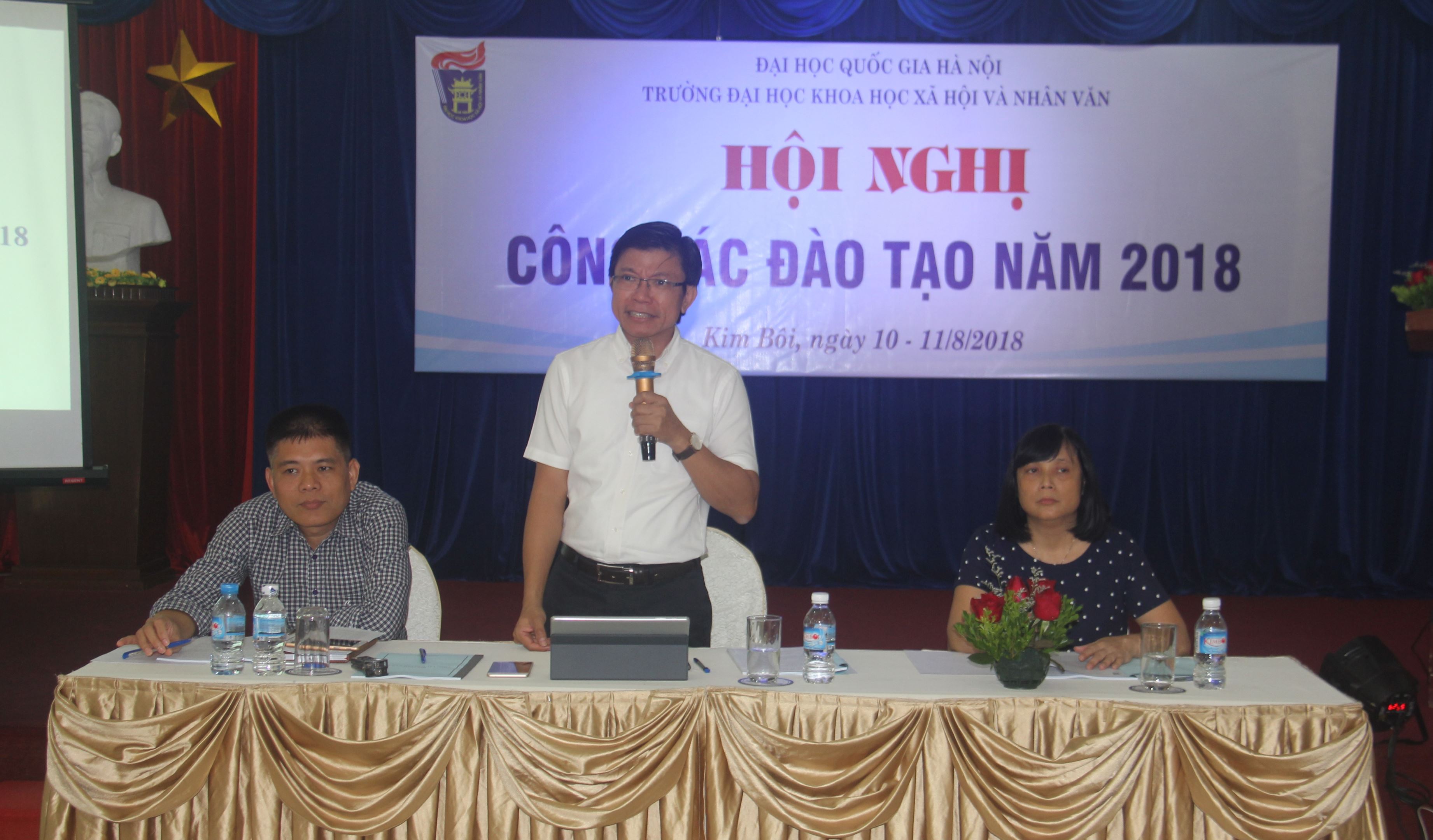
Assoc. Prof. Dr. Hoang Anh Tuan (Vice Principal of the School) spoke at the Conference
In addition, the School needs to boldly adjust enrollment targets, increase targets in majors with great social demand such as Tourism and Travel Services Management, Oriental Studies, Journalism, Public Relations, International Studies, Social Work...; narrow enrollment targets in basic, difficult-to-recruit majors and focus on training to improve quality.
From the perspective of human resource management, Dr. Ngo Thi Kieu Oanh (Head of the Department of Personnel Organization) said that the planning of training sectors/specializations is closely linked to human resource planning because all activities are linked to people, to specific professional capacity, to specific tasks and jobs. The problem in planning sectors/specializations is how to most effectively use diverse scientific human resources, in the direction of connecting human resources between units. Each lecturer must proactively develop and adapt their expertise to expand their own directions. Along with that, the organizational structure of units also needs to be reviewed and arranged in a compact and streamlined direction.
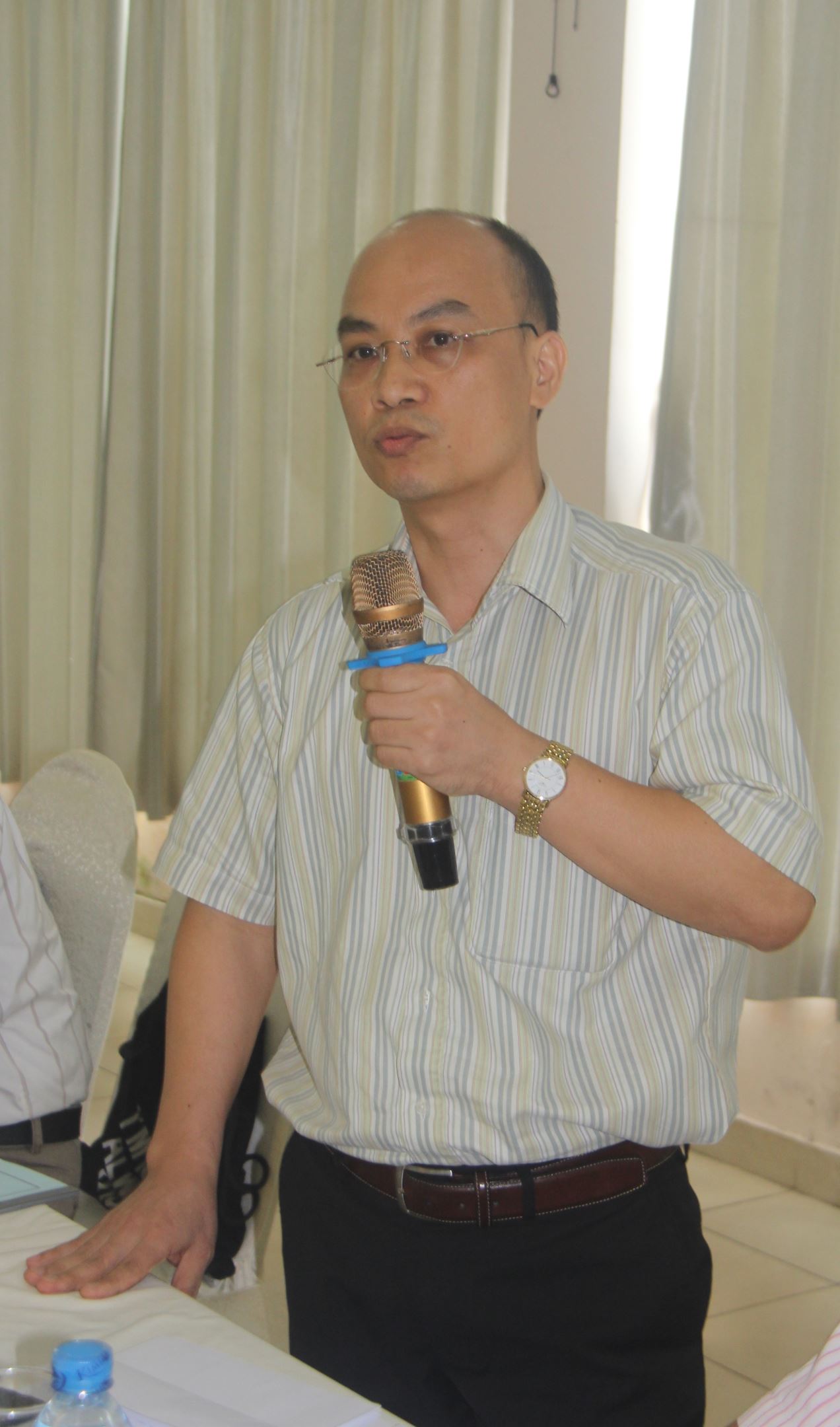
Associate Professor, Dr. Nguyen Van Suu (Head of Anthropology Department)
Representing the Faculty of Anthropology, Associate Professor Dr. Nguyen Van Suu (Dean of the Faculty) proposed to refer to the trend of professional connectivity between majors/specializations at universities around the world; it is necessary to boldly stop enrolling and training social majors that are no longer in demand; invest human and material resources to attract students and improve training quality in the context of increasingly high demands of the labor market. At foreign universities, to increase connectivity, students need to choose to study additional courses related to their majors from other majors... to save on tuition costs and increase job opportunities for learners.
Renewthinkinguniversity administration and qmanagementtrain
The topic of innovation in training management and, more broadly, university governance received special attention at the Conference.
Analyzing the development process of world university ecosystems, Associate Professor Dr. Hoang Anh Tuan (Vice Principal of the University in charge of training and student affairs) warned of the backwardness in university management thinking in Vietnam today. Accordingly, university management thinking often fails to keep up with the needs of learners, the labor market and society. He affirmed: only on the basis of a compatible university management thinking can we properly orient training work, from enrollment activities to the structure of majors/specialties, teaching, testing, evaluation, and academic counseling for learners...
Citing the development of university ecosystems, Vice President Hoang Anh Tuan said that higher education in Vietnam in general and the University of Social Sciences and Humanities in particular have passed through the period of elite universities and moved to the period of mass universities. However, university governance thinking seems to have not really kept pace with the "mass spirit", leading to shortcomings not only in training organization but also in the strategy of orienting training sectors/specialties and investing in the development of the University.
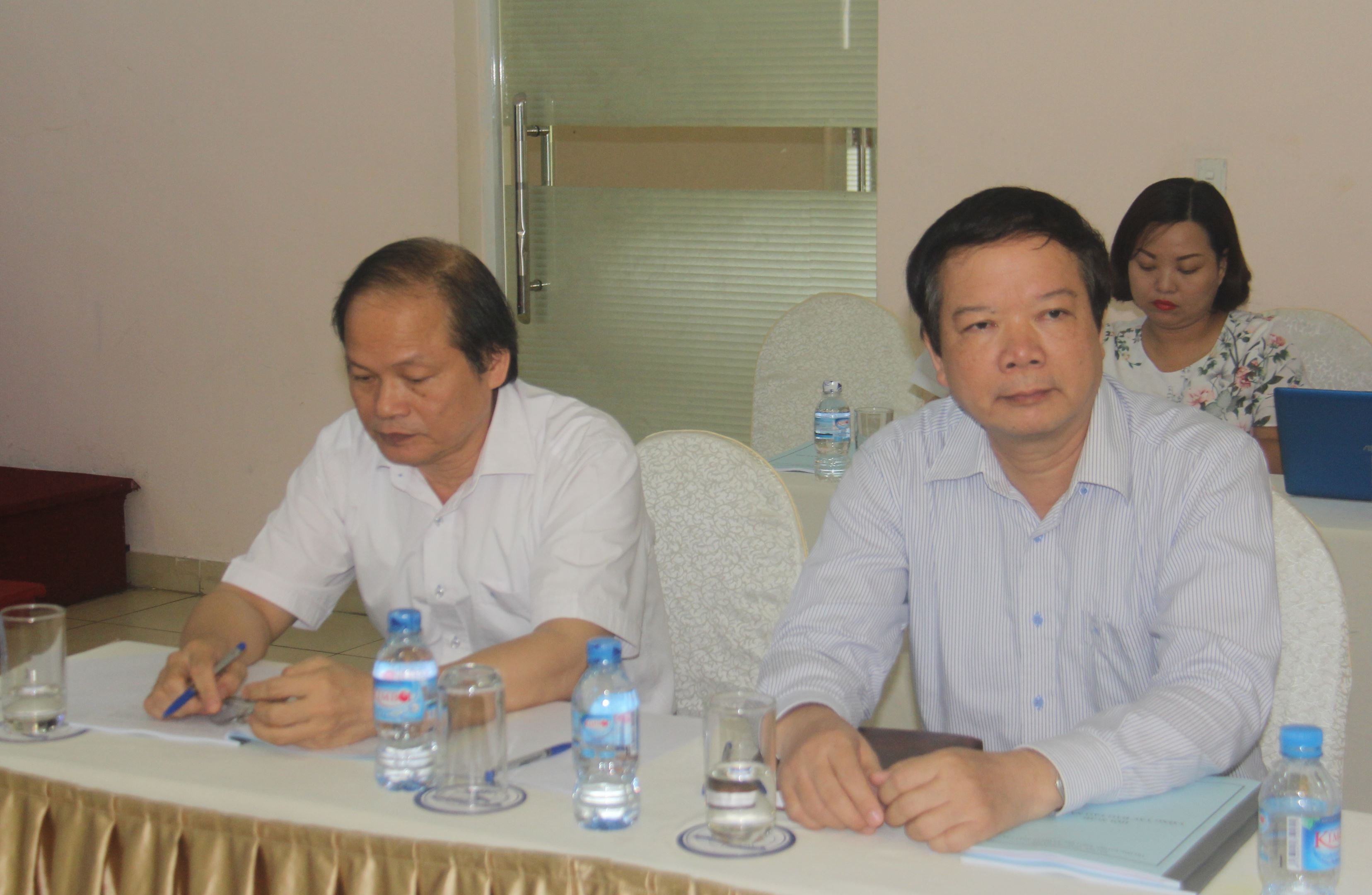
Prof. Dr. Nguyen Van Khanh (Chairman of the School's Science and Training Council, former Party Secretary, former Principal of the University of Social Sciences and Humanities) and Prof. Dr. Nguyen Van Kim (Party Secretary, Vice Principal of the School)
Also paying special attention to innovation in training management towards putting learners at the center, Prof. Dr. Pham Quang Minh (Rector of the University of Social Sciences and Humanities) shared: In the near future, the University will welcome new students of the 10X generation, teachers and training support management departments need to understand the psychology and needs of this generation of students to see if they are different from previous generations of students... We need to stand in their shoes to think and build appropriate support plans, continue to innovate interactions with students, simplify administrative procedures in the spirit of service...
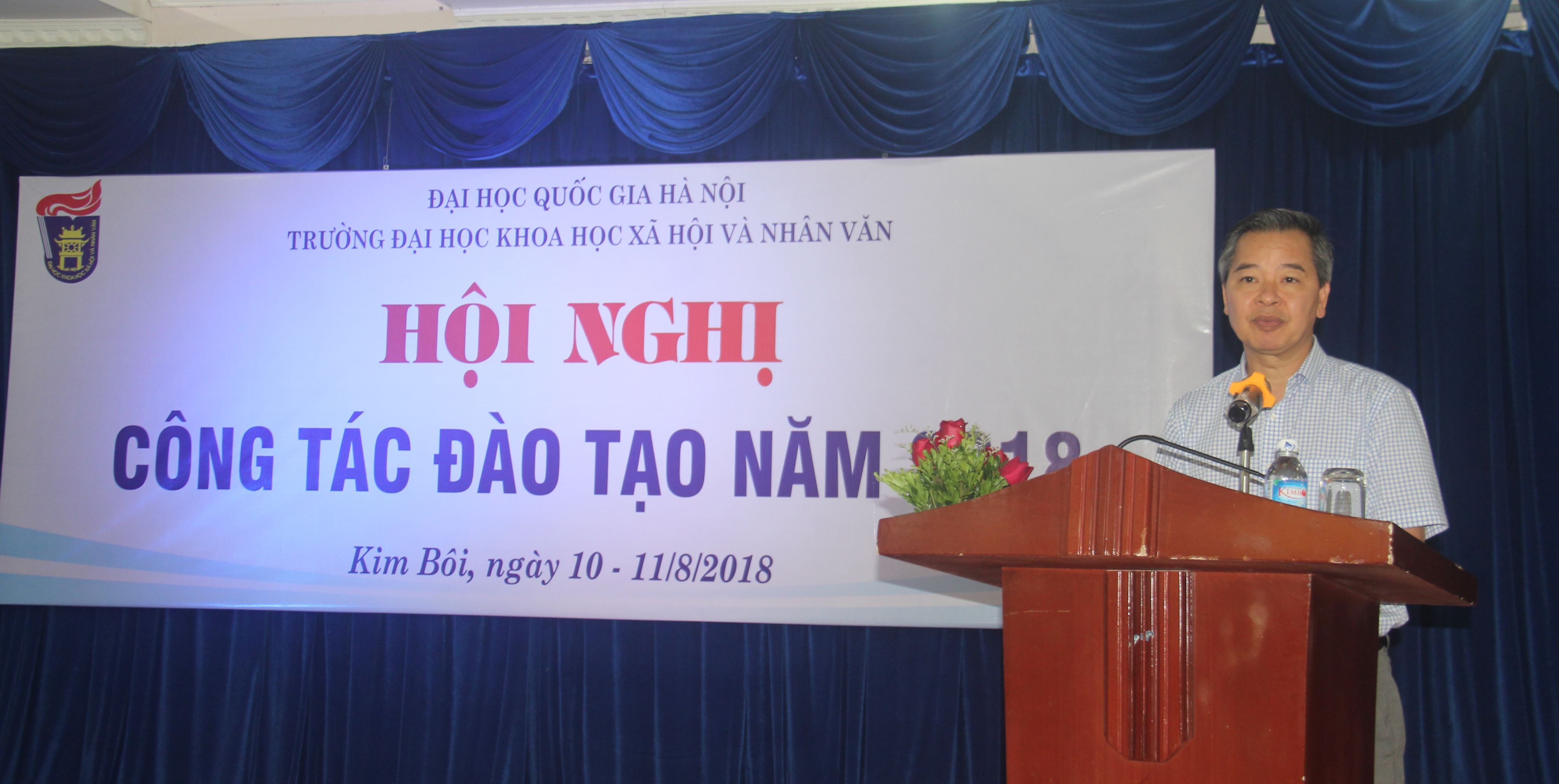
Prof. Dr. Pham Quang Minh (Rector of University of Social Sciences and Humanities) spoke at the Conference
Speaking about the shortcomings in the work of testing and evaluating subjects, MSc. Dao Minh Quan (Deputy Head of Training Department) said that there is a "skew" in the conversion of traditional coefficient scores to the letter system according to credit training. Lecturers seem to not fully understand this conversion, leading to confusion in grading and classifying students, leading to high scores in some subjects.
The relationship between training and employment opportunities for graduates is also of interest to many delegates. Dr. Pham Huy Cuong (Deputy Head of the Department of Training and Student Affairs) analyzed the need to increase the adaptability of training products to the requirements of the labor market. The link between training institutions and employers must be an inseparable relationship right from the beginning of the training process. In addition to professional knowledge and professional skills, students must be equipped with methodologies, approaches, problem solving, creativity and adaptability - skills that help them go further in their careers and lives later on.
TrainPostgraduate: fair competition acceptance
For a research-oriented university, the high proportion of postgraduate training and total training scale is an important indicator. With the promulgation of Circular 08 of the Ministry of Education and Training, Regulations on Doctoral Training of VNU (Decision No. 4555/QD-VNU dated November 24, 2017), doctoral recruitment and training at training institutions nationwide are facing huge challenges, forecasting a serious decline in annual targets. For example, in the first phase of 2018, VNU only received 55 doctoral applications (of which the University of Social Sciences and Humanities had 20 applications). Not only is the foreign language requirement high, the output standard of doctoral training is also a real challenge for graduate students: they must have international scientific articles. According to Professor Nguyen Van Khanh, in order to attract doctoral candidates, the key issue that needs to be solved is to have solutions to support doctoral students in developing their international publication capacity in the context that international publication in the field of Social Sciences and Humanities is not easy.
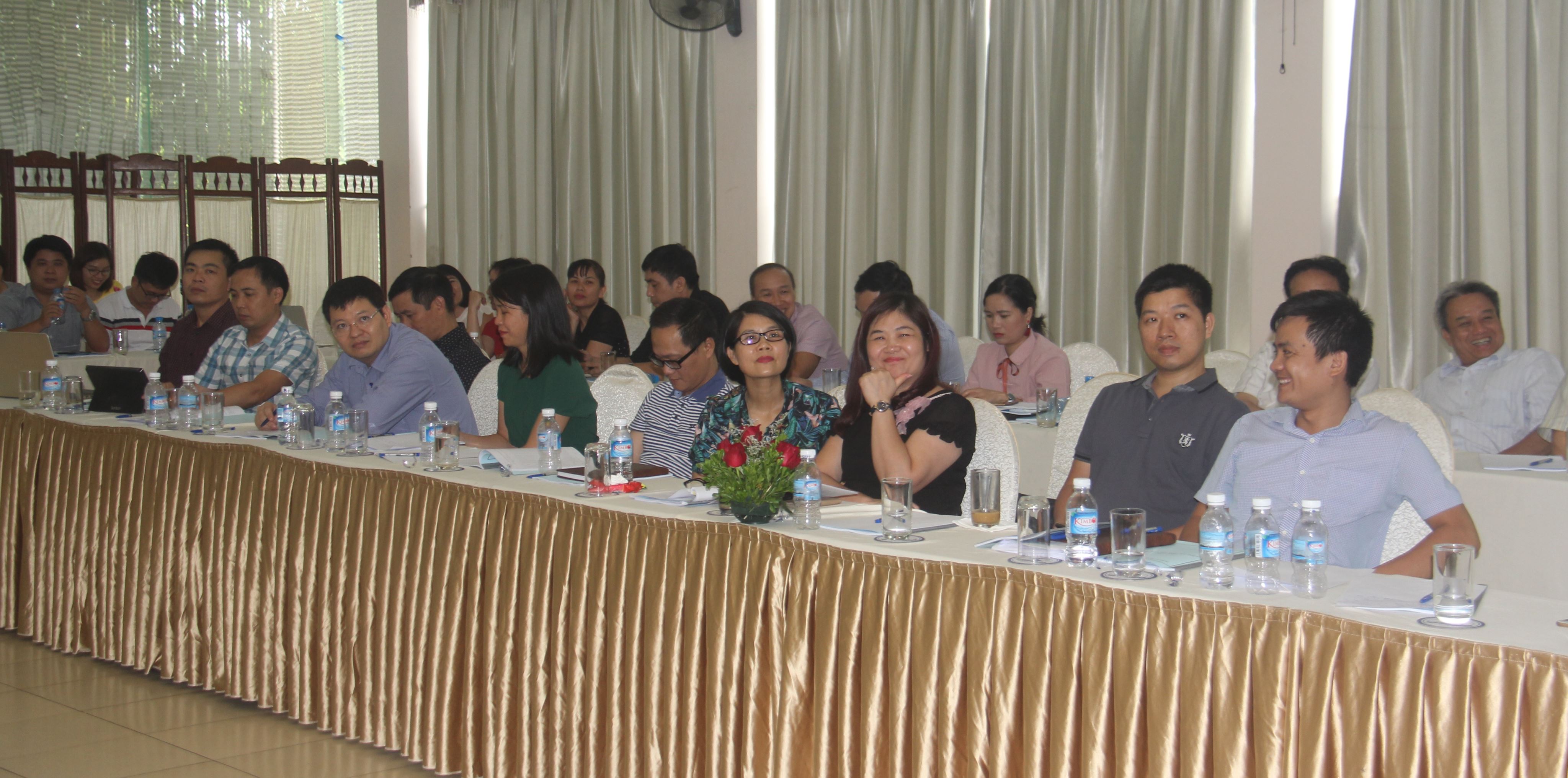
From the perspective of training management, Vice President Hoang Anh Tuan said that the new Regulation on doctoral training may be an immediate challenge for postgraduate training units. However, it also creates a new scientific standard and a level playing field for educational units to affirm their professional capacity. Currently, the University has announced and started implementing a project to support international publications for lecturers and postgraduates of the University, ready to support from 100 to 250 million VND for each international monograph of the teaching staff and postgraduates. From the 2018-2019 school year, implementing the Guidelines of Hanoi National University on pre-doctoral training, the University will support potential candidates to develop foreign languages, enhance scientific research methodology, complete research outlines... before officially applying for the University's doctoral training programs.
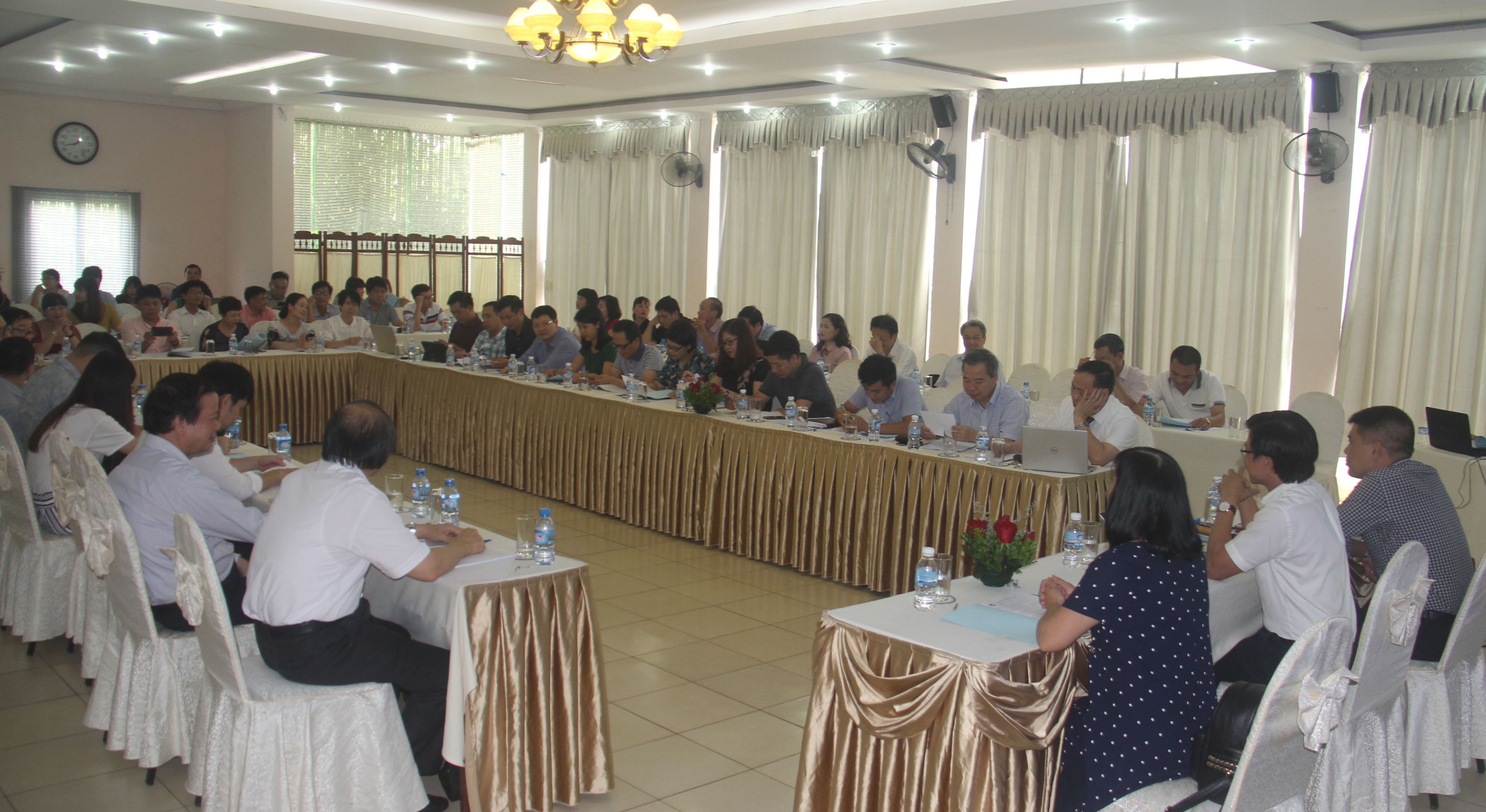
“The transformation of society in general and the university education environment in particular not only puts the University in front of challenges, but also brings us real opportunities for innovation and development. The new Doctoral training regulations create a new playing field for fair competition in postgraduate education. This is the time for us to demonstrate to the community the professional position of a leading social sciences and humanities training unit in the country. To achieve that, we need to further promote the spirit of innovation, strengthen cooperation, share work, and look together in the same direction…!” - Vice President Hoang Anh Tuan spoke at the Conference's Concluding session.
Author:Thanh Ha
Newer news
Older news